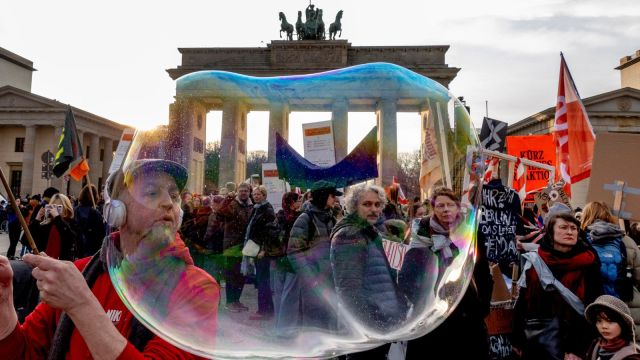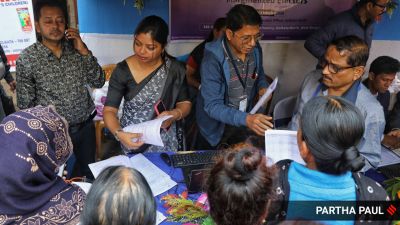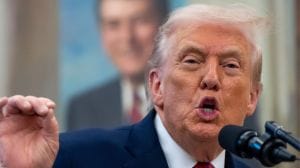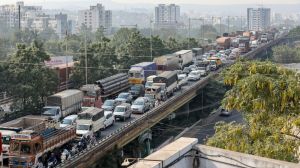Stay updated with the latest - Click here to follow us on Instagram
German Elections 2025: Opinion polls indicate major shift in Germany’s national elections
2025 German Federal Election: The AfD is now positioned to make history, with polls suggesting it could become the country’s second-largest political force—a first for a far-right party since World War II.
 A man makes soap bubbles in front of the Brandenburg Gate in Berlin, Germany, one day ahead of the German election. (AP)
A man makes soap bubbles in front of the Brandenburg Gate in Berlin, Germany, one day ahead of the German election. (AP)German Election 2025: Germans are heading to the polls on Sunday in a crucial national election, with opinion polls indicating that a change in leadership and a new governing coalition are on the horizon.
Unlike previous elections, which have often been predictable, this campaign has been marked by dramatic developments.
Political upheaval
Chancellor Olaf Scholz, leader of the Social Democratic Party (SPD), faced a major political setback last November when he dismissed his finance minister. The move led to a vote of confidence, which he lost, forcing early elections.
Adding to the political turmoil, tech billionaire Elon Musk publicly backed the far-right Alternative for Germany (AfD). This endorsement triggered a national debate about Germany’s historical responsibility, with Scholz condemning Musk’s stance as “disgusting,” according to CNN.
 Several thousand people hold up lights at a demonstration for democracy on Rathausplatz, the day before the Bundestag elections, in Augsburg, Germany, Saturday, Feb. 22, 2025. (Photo: AP)
Several thousand people hold up lights at a demonstration for democracy on Rathausplatz, the day before the Bundestag elections, in Augsburg, Germany, Saturday, Feb. 22, 2025. (Photo: AP)
The AfD is now positioned to make history, with polls suggesting it could become the country’s second-largest political force—a first for a far-right party since World War II.
Key candidates for chancellor:
Friedrich Merz (CDU)
The Christian Democratic Union (CDU), the party of former Chancellor Angela Merkel, is leading in the polls, with its candidate Friedrich Merz seen as the frontrunner. The CDU and its Bavarian sister party, the CSU, are projected to reclaim their dominance in German politics.
Merz has taken a tougher stance on immigration compared to Merkel’s open-border policies. He pushed for stricter immigration laws, even attempting to pass legislation with the support of the AfD—an unprecedented move that sparked protests. However, Merz later clarified to CNN that working with the AfD was “not an option.”
Alice Weidel (AfD)
Alice Weidel, co-leader of the AfD, has built her campaign around anti-immigration policies. The party saw significant gains in regional elections last year, and polls now place it at around 20% nationally.
Weidel has vowed to enforce “remigration”—a term linked to Nazi-era policies—by closing borders and deporting undocumented migrants. Speaking at an AfD rally, where Musk appeared via video link, she told CNN that this would be one of her first actions as chancellor.
Olaf Scholz (SPD)
 Federal Chancellor Olaf Scholz (SPD) gives a press statement after the end of the election campaign in his constituency, in Potsdam, Germany, Saturday, Feb. 22, 2025. (AP)
Federal Chancellor Olaf Scholz (SPD) gives a press statement after the end of the election campaign in his constituency, in Potsdam, Germany, Saturday, Feb. 22, 2025. (AP)
The SPD, which won the 2021 election, now risks a major defeat, with polls predicting a significant drop in support. Scholz’s coalition government, known as the “traffic light” coalition due to its alliance with the Greens and the Free Democrats (FDP), has been plagued by internal conflicts, leading to growing discontent among voters.
One survey last year ranked Scholz as Germany’s least popular chancellor since reunification. Speculation even arose that Defence Minister Boris Pistorius could replace him as the SPD’s candidate, though this did not happen.
Robert Habeck (Greens)
The Greens, polling at about 13%, are unlikely to win outright but could play a key role in coalition negotiations. Their candidate, Robert Habeck, currently serves as Germany’s economics minister.
Election issues:
Immigration and economy
Immigration has dominated the election debate, especially following several high-profile attacks linked to asylum seekers. Scholz introduced border checks with neighbouring European countries to address security concerns, a move seen as an attempt to win back voters shifting towards the AfD.
The economy is another critical issue. Once Europe’s economic powerhouse, Germany has seen its GDP shrink for two consecutive years. Challenges include the aftermath of Russia’s war in Ukraine, increasing competition from China in the automotive sector, and potential trade tensions with the United States under Donald Trump’s administration.
Germany’s car industry, a pillar of its economy, is struggling. Volkswagen and other manufacturers face possible mass layoffs and factory closures, raising concerns about the country’s long-term economic stability.
What comes next?
Germany’s political system rarely allows a single party to govern alone, meaning coalition talks will follow Sunday’s vote. Past negotiations have taken weeks or even months to form a government.
One thing appears certain: despite its strong polling, the AfD is unlikely to be part of any governing coalition, as other parties have ruled out working with it.
As Germany waits for the election results, one challenge remains clear—the next government will face tough decisions in steering the country through a period of political and economic uncertainty.
- 01
- 02
- 03
- 04
- 05































